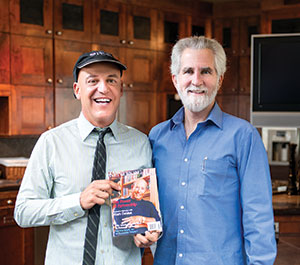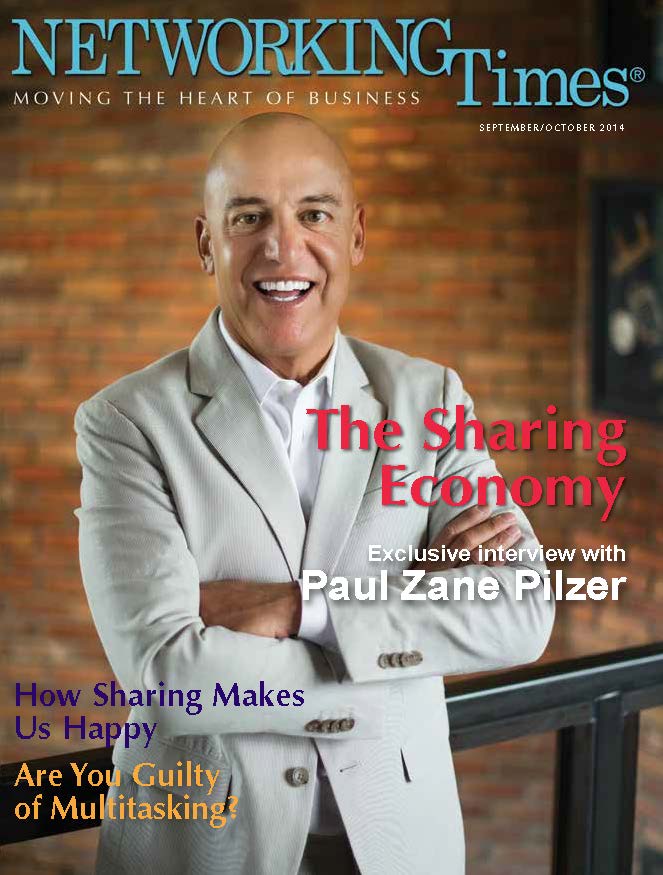
The Sharing Revolution
Networking Times – October 2014
The Sharing Revolution – A Conversation with Paul Zane Pilzer
By Dr. Josephine Gross
You probably know Paul Zane Pilzer from his bestselling books Unlimited Wealth: The Theory and Practice of Economic Alchemy (1990) and The Wellness Revolution: How to Make a Fortune in the Next Trillion Dollar Industry (2002).
What you may not know is that Paul Zane Pilzer is a world renowned economist, social entrepreneur, and New York Times bestselling author of seven more books. He also served in two U.S. Presidential administrations and is the founder of five companies, several of which regularly make the front page news.
Networking Times interviewed Paul about his book God Wants You to Be Rich (1995) in the summer of 2003 for an issue on Spiritual Marketing. When we found out he was writing a book on the sharing economy and researching its implications for network marketing, we thought it was time to visit him again.
“In many ways, network marketing invented the sharing economy,” Paul says. “This new business phenomenon applies the rules of network marketing to more traditional areas like hotel rooms and travel, creating enormous wealth in the process, because sharing saves resources and adds value for everyone involved.”
Just like network marketing, the sharing economy is about people serving people. Taking excellent care of customers comes first and gets rewarded, because they go online and tell everyone about it. These are foundational principles for network marketing, and the technology of the sharing revolution lets everyone actualize and multiply them.—J.G.
You have a longstanding relationship with network marketing. Can you give us a quick recap?
I became known to network marketers in the 1990s when I was on the Larry King Live TV show being interviewed for my book Unlimited Wealth, which Sam Walton endorsed and made standard reading for Walmart employees.
With manufacturing moving overseas, everybody was complaining, “We’re losing all our jobs!” Which I explained is good. Eighty percent of the value of a retail product is in its distribution, not its manufacturing. In the 1980s if you bought an item that costs $100, $20 was the fully loaded manufacturing cost—heading to $10—and $80 was distribution cost. This was a big change from the 1960s, where 50 percent of the cost was manufacturing and 50 percent was distribution.
Manufacturing was the way to make a living, but today, you’re not going to get rich trying to take the 20 percent manufacturing cost and halving it down to $10. But you can get rich by asking, “How do I lower distribution cost 10 percent from $80 per $100 item down to $70, $60, $50?” And what was the most expensive part of distribution?
It was teaching people what the product was and how to use it. The great opportunities lie in distribution, and that’s why Sam Walton’s family was then and is today one of the richest in the world. Walmart doesn’t have a product brand, they just distribute other people’s products. Another example is Fred Smith who founded Federal Express. Who had ever heard of an airline that won’t fly people? Instead of flying people and putting cargo in the bottom, he flies the cargo up top and became the most profitable airline.
In other words, distribution was king. Network marketing was a great form of distribution that I didn’t know existed when I originally wrote Unlimited Wealth. After my book came out, people started contacting me, so that’s how I originally started working with network marketing companies.
Our readers also know you from the Wellness Revolution.

Visiting with Chris Gross, cofounder of Networking Times
Wellness was a word I brought into our vernacular. I didn’t make up it up, it was actually used mostly by cancer care companies in the 1990s. A wellness center meant an oncology center. I said, “We need a new word to redefine the medical industry,” which I redefined as the sickness industry. I said, “The products you take to avoid becoming a customer of the sickness industry are wellness products.” I wrote the first book, The Next Trillion (1999), which talked about a trillion-dollar business coming in wellness. The second book was The Wellness Revolution (2002) and that book became the number one foreign book in China as The Fifth Wave. The Chinese liked that book so much, that from 2002 to 2013 they regularly invited me to China to speak on the wellness revolution.
In 2007 I wrote The New Wellness Revolution, which talked a lot more about network marketing and its role in the wellness industry.
The key here was the difference between the wellness industry and the wellness revolution, because that’s going to segue to what I’m working on now. Why was it a revolution? The wellness industry was around. I started tracking it to show that the wellness industry would hit a trillion dollars. But it became a revolution when the primary reason you bought products was wellness.
For example, you go out to buy orange juice and you see on the box “calcium added.” It has 400 mg of calcium per serving, more than whole milk. If you buy the product because you want orange juice, you’re buying food. But if the primary reason was to get the extra calcium, some type of preventative medicine or wellness effect, that’s the revolution.

With wife Lisa at their home in Park City, UT
That brings us to the sharing economy versus the sharing revolution.
Sharing has been the biggest economic shift of the last five to eight years. Most people know the story of Airbnb, which stands for Air Bed & Breakfast. It started with three entrepreneurs who couldn’t pay their rent in San Francisco. So they started renting out to convention goers an air mattress on the floor. Overnight that became a $10 billion business and the largest hotel chain in the world in terms of occupied beds every night, simply by allowing people to use technology to take an unused room in their house and share it with a visitor.
As an economist I am fascinated by this. Sharing has been around since cavemen days. They figured out, “Let’s not go kill this wild animal by ourselves, let’s kill it together and share the food before it goes bad among four or five families.”
The sharing economy was about creating greater efficiency while lowering cost. You might argue marriage is two people sharing the work of raising a family. The sharing economy as a way of saving money has always been around, but it’s now an enormous phenomenon thanks to technology. We’ll cover that in a moment.
The sharing revolution is a term I coined, and it’s the title of my next book. Why do I call it a revolution? Because the reason you share is not just to half the price, it’s also to double the value. While the sharing economy is “get it cheaper,” sharing revolution is “get it better.”
For example, you need a cab to get to the airport. Traditionally you call a cab company and hope someone’s going to show up. You have no idea who you’re getting.
With Uber you don’t get a cab, you get a much cleaner, nicer car. You can read the reviews of who your driver is; and most important, when you enter “I want to go to the airport”, you get a list of eleven cars that are ready to take you and a GPS map shows you where they are. One of them is eight blocks away, one six blocks away, one is one block away. When you click “Buy it,” you watch the car come to get you.
In other words, Uber is a much better service. While you can’t legally turn a private car into a taxi, Uber skirts all the rules by using technology that allows users to know lots of things about each other quickly, so they “make friends” first. Then it becomes perfectly legal for me to give you a lift to the airport.
Now, suppose you’re in network marketing, and at any given time in your area there are ten people you’ve been trying to connect with about your business. When trying to book a ride to the airport, wouldn’t you like to press a button that said, “These are the people you’ve been exchanging calls with for the last three weeks.” Because you are both successful professionals, you haven’t had time to meet. Next, the program informs you, “Of these ten people, these two need a ride to the airport right now. In fact one of them is on your flight.”
You see how technology can take that ride to the airport and “double the value” of that experience. Let’s say if you drive by yourself, the cost of your car, gas, and airport parking is $80. You can share the ride with a stranger and knock the cost down to $40. That’s the sharing economy. The sharing revolution is where you schedule that drive so you can swing by someone’s house to give him a lift, and this is a person you’ve wanted to share your network marketing business with, or she’s on the board of the school you want your daughter to get into.
The sharing revolution takes something as simple as a ride to the airport that would have just occupied time, and made it a much more productive experience, because now you’re getting to ride with someone you wanted to meet. That takes the value from the $80 cost to ride by yourself, or halving the cost to ride with someone, to doubling the value by having someone in the car with you that you want to talk to, bringing it to a potential $200, $300, or $400 gain or more if that person joins your business.
The sharing revolution is sharing primarily to double or more the value of everything you own, versus the sharing economy is about halving the price. You get both with sharing.

One of Paul´s companies is Zaniac Learning, offering an after-school curriculum to help kids develop math and technology skills.
How do you see network marketing fit into this revolution?
Underlying all this is the concept that lies at the foundation of network marketing—choosing who you’re sharing with to add maximum value. Obviously, you’re not going to want to jump into a car and ride to the airport with some stranger who’s going to talk your head off, or someone you have nothing in common with, or someone who’s going to be late.
The real value in sharing is not just to half the price at any cost, but to double the value and meet some new and interesting people. Airbnb’s slogan is not “Get some money by renting out a room in your house!” It’s “Have a fascinating house guest this weekend!”
What’s amazing about network marketing is that it was founded on this sharing revolution mentality, even more so than the sharing economy mentality. Everyone you do business with, you’ve chosen. It’s not just “I’m desperate. I need to find someone to help me build my network marketing business.” Instead, you sat next to someone in church. You enjoyed meeting somebody. You had an item that needed repair and this person was able to fix it. You had an experience with that person that made you think, “I’d like to get to know you,” or “That’s a person I’d like to be my partner,” or “That’s a person I’d like to teach what I know, and they’ll teach me what they know, and we can build a business together.”
In many ways network marketers were the forerunners of the sharing economy, and more importantly, of the sharing revolution, which is about adding the value. In networking marketing you select people with whom you have common values before you go into business with them. This is totally different from working in an office or a retail store, where when a customer comes in, you have no control over them, and they have no control over you, and you’re forced to deal with each other. Network marketing lets you make that choice, and that’s what ultimately drives the sharing revolution.
The compensation plan of network marketing looks like it was designed for the sharing revolution, to add value without taking away from your earnings. When you schedule a meeting to present your opportunity, you invite your upline to join you—not to share expenses or share the profit—but to add the value your upline brings to the presentation at no cost to you, and to get feedback on improving your presentation skills.
Can you give us another example?
Think about renting out a room in your house. Would you want to rent to just anyone? No, you want to find someone you know or have something in common with. Now you’ve got a fascinating houseguest. It’s about more than just making some extra dollars on the room. That’s what network marketing has always done. People first get to know each other, and then share a business opportunity. By the way, how many network marketers have stayed in someone else’s home when they went to open up a new city, instead of staying in a hotel?
Network marketing fits the model I see among my successful friends who make hundreds of millions of dollars. They are picky about who they do business with. They reason, “I only have a number of years left, I have only so many free hours after spending time with my children and grandchildren. I’m going to be intentional about who I invite into my space.”
They choose business opportunities based on who they enjoy working with, which is similar to network marketing, except network marketing comes with this benefit day one. The ability to choose who you want to do business with based on personal criteria is what makes it fun. All of a sudden it’s not work, it’s something you enjoy because you want to spend time with that person, independent of the business.
Once you choose the people you want to work with, you train them back and forth, and when you succeed, your bond is incredibly strong. These people become your best friends for life, and that’s the true wealth. When you get to whatever age you might call the second half of your life, when you finally accumulate enough capital that it’s not your primary worry, you think, “What can I do that’s enjoyable, that adds to my relationship with my wife, with my family, with my children?” Network marketing comes with that from day one.
Being an innovative business model also attracts scrutiny and opposition.
Network marketing is phenomenal in that it breaks the mold. It is the ultimate most disruptive business to the status quo. The Internet disrupted the travel agency business. It also disrupted real estate by letting people sell homes to each other without paying a commission to a real estate broker. The Internet has changed so many things for the better—and it’s just starting. It lets you break the “bad” rules. For instance, if I introduce you to a home in my town and you buy it, and you take me to dinner to thank me, that’s a felony, because we broke a real estate brokerage rule. That is a bad rule the Internet is doing away with.
Most of all, the Internet allows you to get comfortable with whomever you consider inviting into our house or doing business with, but network marketing was the original rule breaker here. Imagine you had a chain of department stores with salespeople to teach consumers about products, and you had built all this retail up over the last 50 to 100 years. All of a sudden, along comes a network marketing company that says, “I can teach you better about the product, not in a store, but in your home where you’re going to use it, and then I’ll let UPS deliver it, so you don’t even have to carry it home.” This is why network marketing became a $100 billion business.
I can see how disruptive it is to the guy who built the store.
The powers that be are trying to stop network marketers saying they don’t collect the sales taxes, they don’t do things right, or they don’t sell the right goods. You can see why, because retail stores are an inferior way of distribution, particularly of intellectual content products, products that require knowledge on how to use them. Since they can’t argue with the method of distribution, they come after you saying the store’s illegal. The store’s a pyramid scheme. They attack you. Why? They are terrified of being put out of business.
That’s ultimately behind some of the problems some network marketing companies are having today, because once they cross into the multibillion- dollar level, they’re a serious player. They can spend equal or more in R&D than the traditional pharmaceutical companies. They’ve got a much better method of distribution. Companies using the traditional method of distribution can’t beat them, so they try to close them down through regulations or trying to get government entities to step in. They manufacture negative stories that aren’t true, but what they are really saying is, “You’ve got a better business than I have to serve customers…”
Network marketing has always put people first.
Yes, network marketing has an absolute devotion to customer service. Why? Because the customer is your friend. When you sell something to a customer in a store, you might think, “I got rid of that bad car. We sold it off the lot. I’ll never see him again.”
In network marketing you’re going to see everyone again. There’s no such thing as a lie or an exaggeration you’re going to get away with. It’s going to come right back. You better know all the information on your product, because when you work with someone, it’s most likely a consumable, not a onetime sale product. You will have to deal with your customer again and again. When I deal with them honestly and fairly, I also make great friends who give me great referrals. Network marketing requires you to provide people with a positive experience from day one.
It also leaves an honor trail, because whatever you tell someone, they’re going to tell others. As opposed to when you go in a store and someone tells you something and you buy it, you may never walk in that store again. The honor trail left behind by network marketers is the reason network marketing is currently so successful in wellness, fitness, financial services, telecommunications, travel, energy—all areas where ultimately what you deliver is your integrity, your product knowledge, and the positive experience for your customer.
Network marketing was founded on many of the values and behaviors we’re just now learning on the Internet with technology. The sharing economy—and now the sharing revolution as we defined it—is really just adopting network marketing practices and procedures. You might write a manual called “the best practices and procedures of a network marketer” and it would work for the sharing economy and the sharing revolution.
This is powerful validation for our business and profession.
It’s been very gratifying for me to find the old rules when studying the sharing revolution. I’ve been around the network marketing community for twenty-five years and I’ve been fortunate to have spoken to many and gotten to know some of the leaders.
I see network marketing spanning into every possible field, and not just sharing power or sharing wellness products, but network marketing is going to be in many ways the gatekeeper to the sharing economy. Ultimately we all want to interact with a human being. There is so much value-added in sharing that there’s room to pay a middle person, not a middle person who says the government gave me a monopoly on this street corner, but a middle person who really adds value.
Personally, I find I really can’t keep up with the sharing economy. For example, when I travel with my four kids we avoid hotels, and I’m overwhelmed at the great homes I’m able to find and rent around the world. These homes aren’t just great a place to stay for less money than a hotel; they come with a wonderful homeowner who has no vested interest, and tells me the places to visit, where to go to dinner, and so on. But here’s what’s missing: I need a gatekeeper. I don’t have the time to research all the different homes and make sure it’s the right place, and when I’m taking my kids and my wife somewhere I want it to be perfect.
Why isn’t there somebody in the network marketing business who’s like a front end to Airbnb, who gets to know me and could say, “These are the good websites to share. I put the time in. I’ve already called a few of the home owners. They now know who you are, and they’d like you to come rent their home, and here’s the one I recommend.”
I need a human being to explore the possibilities, and I’d be willing to pay for that. I can rent a luxurious home at half the price of the equivalent luxury hotel, so there’s value in that equation, but right now there’s no one to help me navigate that process. Network marketing has always been focused on the consumer having a good experience. That’s what the sharing is all about and the things we need to fix in sharing is where people rent a bad place, or don’t get the right information, or they didn’t get the right reviews before dealing with the seller of the house or B&B. Network marketing can add some significant value there, and I expect it to.
Any closing thoughts?

Pilzer practices The Sharing Revolution when it comes to summer vacation with his family. “In just the past 4 weeks we have rented homes In Jerusalem, Israel and in Coronado, California for one week that would cost more than $10 million each to own–and the host families have become our friends who we look forward to seeing every year.”
I see so many opportunities for network marketing to grab different areas of the sharing economy and lead them, primarily because they’ve already figured out all the rules. Most importantly, the technology lets you break all these rules about price fixing and deliver what consumers really want.
The network marketing success principles of the last five decades have now been converted to billion-dollar companies worldwide and they’re just getting started. Ultimately to thrive in this new economy you want to learn the better method, which comes from growing your network marketing business. The secondary part is to apply technology, which also happens through education.
What our economy is missing is education for new methods and better ways to do business. Who’s filling the gap? Only network marketing is stepping up to the plate to face this challenge, which is the need to retool people who don’t have the skills, knowledge, contacts, or whatever they need to succeed in today’s economy.
Network marketing holds the key to resolving on our biggest global issue, which is retraining the unemployed, because it is the only model that succeeds economically by teaching individuals new skills that will help them succeed in a changing world.


